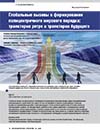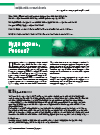Global Challenges in Formation of a Polycentric World Order: Retro Trajectories and Trajectories of the Future
DOI: 10.33917/es-1.167.2020.28-35
Global challenges as the core of the processes of globalization and formation of a new world order provide direction and rhythm of transformation processes in all countries. The article dwells on a set of interconnected global challenges, their retrospective dynamics and future trajectories. Particular attention is paid to the place of Russia in global transformations. It was revealed that thanks to measures taken at all levels of management, positive dynamics have formed in relation to many challenges, but the progress is developing at the expense of ecology and safety. Critical for Russia is a fundamental science cost lag; with such a gap, we won’t be able to ensure defence, economic and technological security and will form the future for ourselves on the far reaches of the world progress





